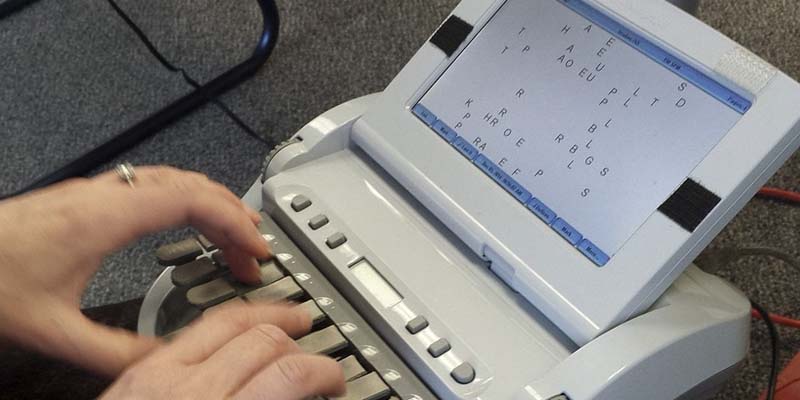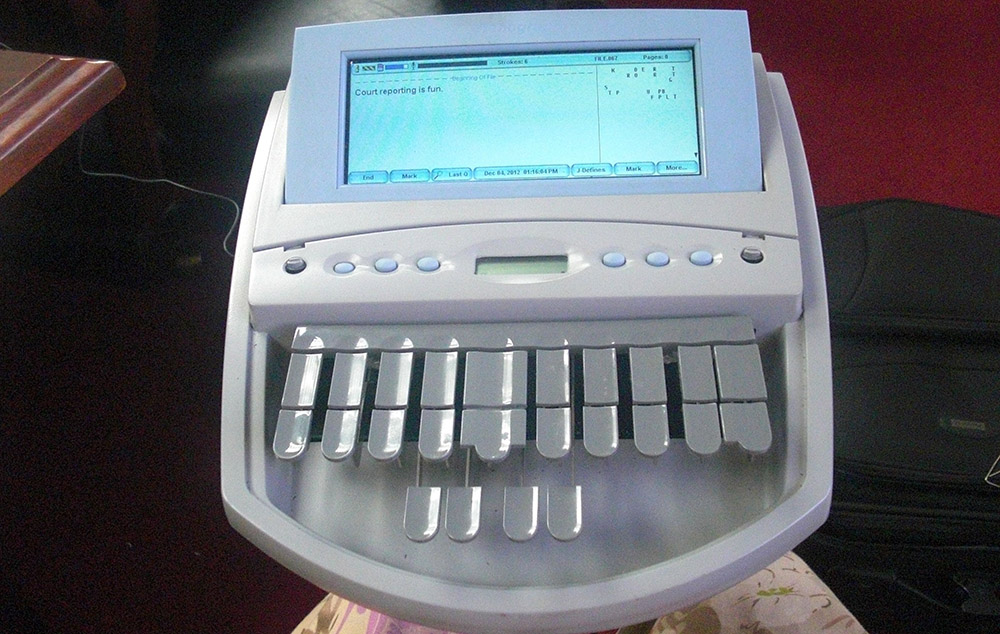Why Court Coverage Is Needed for Accurate Legal Paperwork
Court coverage plays a crucial function in the lawful system. It supplies an exact, verbatim record of court proceedings. This precision is essential for preserving the integrity of legal procedures. Mistakes in documentation can bring about considerable effects for situation end results. As lawyers progressively rely upon these records, comprehending the nuances of court reporting ends up being essential. What aspects add to the performance of this technique in ensuring justice?

The Duty of Court Reporters in the Legal System
Court press reporters act as the crucial web link in between spoken statement and composed document in the lawful system. They are liable for recording verbatim accounts of court procedures, assuring that every word spoken is accurately recorded. This transcription comes to be an official document, necessary for charms, legal research study, and preserving the integrity of judicial procedures. Stenotype reporter utilize specialized equipment and strategies, such as stenography, to facilitate this specific paperwork. Their role expands past simple transcription; they need to recognize lawful terminology and court room procedures to assure clarity and context in their documents. In enhancement, stenotype reporter maintain discretion and impartiality, contributing to the general justness of the lawful process. Their job is essential for parties, lawyers, and judges included in lawsuits, as it provides a reputable account of process that can be referenced in future lawsuits. Through their experience, stenotype reporter support the standards of justice within the lawful system.
Making Sure Accuracy in Legal Transcripts
Maintaining accuracy in lawful transcripts is critical to the stability of judicial process. Stenotype reporter play a crucial function in catching every talked word throughout tests, depositions, and various other legal setups. Their know-how in stenography and experience with lawful terminology warranty that transcripts reflect the exact discussion and subtleties of the case. Any type of errors or noninclusions can cause misinterpretations, which might adversely influence the results of legal conflicts.
To achieve this level of precision, stenotype reporter make use of sophisticated innovation and rigorous training to enhance their transcription skills. They additionally engage in comprehensive evaluation processes, cross-checking their job for accuracy before settling records. Additionally, assuring proper context and speaker identification adds an additional layer of dependability to the transcripts. Eventually, exact lawful records function as foundational documents that maintain the justice system, enabling all events involved to count on a precise record of proceedings.
The Importance of Real-Time Coverage
Real-time reporting has actually arised as a significant improvement in the field of court coverage, enhancing the performance and accessibility of lawful proceedings. This technology enables court reporters to record spoken dialogue instantaneously, giving prompt access to records for lawyers, judges, and various other legal personnel. With real-time coverage, participants can quickly review disagreements and declarations, helping with more informed decision-making during process.
Furthermore, this ability is especially valuable in complex instances where fast comprehension of details is necessary. It promotes clearer communication among all celebrations, decreasing the possibility of misunderstandings. In addition, real-time records can be shared from another location, benefiting those unable to attend in individual, thereby widening access to justice. As lawful atmospheres end up being increasingly dynamic, the duty of real-time coverage in making sure precise and timely details circulation can not be overemphasized, making it an indispensable tool in contemporary court reporting techniques
Lawful Documentation and Its Impact on Case Outcomes
Efficient legal documentation plays a vital role fit instance results, given that it acts as the structure upon which lawful debates are built. Exact documents ensure that all relevant facts, statement, and evidence are plainly offered, enabling lawyers to construct compelling situations. Inaccuracies or omissions in documents can lead to misconceptions, which might adversely impact the court's choice.
Moreover, well-organized paperwork promotes reliable case administration, enabling attorneys to quickly reference critical details throughout proceedings. Juries and courts depend greatly on documented proof to understand the context and subtleties of a situation. As a result, the quality of legal documentation directly affects the credibility of arguments offered in court.
Eventually, thorough and exact legal documents not only boosts the opportunities of desirable outcomes however also supports the honesty of the lawful procedure, ensuring that justice is served accurately and fairly.
Developments in Court Reporting Technology

As modern technology continues to progress, improvements in court coverage have actually significantly changed exactly how legal documentation is created and handled. Developments such as real-time transcription software program allow stenotype reporter to supply instantaneous accessibility to transcripts, enhancing the effectiveness of legal proceedings. Digital videotaping systems have likewise emerged, giving a reputable back-up to conventional techniques, while artificial intelligence is progressively being integrated into the documentation procedure, boosting accuracy and minimizing human mistake.
Additionally, cloud-based platforms promote safe and secure sharing and storage of court documents, guaranteeing that legal groups can access find this essential data from anywhere. Remote court reporting has actually ended up being commonplace, enabling legal professionals to join process no matter geographical location. These technical improvements not just streamline the court reporting process yet likewise enhance the overall honesty of legal documentation. Consequently, the lawful field is better furnished to meet the demands of modern-day lawsuits, ensuring that justice is offered successfully and successfully.
Frequently Asked Questions
What Certifications Do Court Reporters Typically Need?
Court press reporters typically need a secondary school diploma, specialized training in court coverage, and effectiveness in shorthand or voice writing. Accreditation and licensure needs vary by state, improving their reliability and making sure specialist criteria are fulfilled.
Exactly How Do Court Reporters Maintain Discretion?
Stenotype reporter keep confidentiality by sticking to strict moral standards, making use of safe approaches for keeping and transferring transcripts, and making certain delicate info is shared just website link with authorized people associated with the lawful procedures.
Can Court Reporters Operate In Other Setups Besides Courts?
Court reporters can certainly operate in numerous settings past courts, including depositions, service conferences, and legislative assemblies. Their abilities in recording talked language properly make them useful in any type of environment calling for precise documentation.
What Is the Average Income of a Stenotype Reporter?
The average income of a court press reporter varies commonly, typically varying from $50,000 to $100,000 yearly, depending on variables such as experience, location, and the particular industry in which they are employed. (durham court reporting)
How Lengthy Does It Take to Become a Licensed Court Press Reporter?

Court press reporters offer as the important link between talked testimony and created document in the legal system. In addition, court press reporters preserve discretion and impartiality, contributing to the overall justness of the lawful procedure. Advancements such as real-time transcription software application enable court press reporters to supply immediate access to transcripts, improving the performance of legal procedures. Court reporters usually need a high institution diploma, specialized training in court coverage, and proficiency in shorthand or voice writing. Court press reporters can indeed function in different setups past courts, see page including depositions, business meetings, and legislative assemblies.